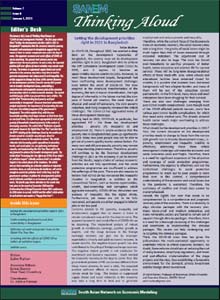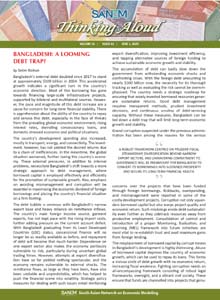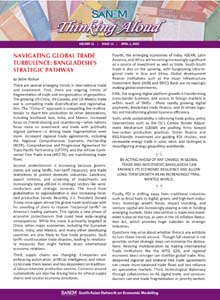
Thinking Aloud: Volume VII, Issue 8: January 2021
 The January 2021 issue of Thinking Aloud focuses on “COVID-19 and Development Priorities”. The first page article titled “Setting the development priorities right in 2021 in Bangladesh” emphasizes that the concerns related to poverty, inequality and employment in Bangladesh suggest that no reason is there to remain complacent now and in the days to come. The apparent economic and social effects of COVID-19 can be deceiving. The ground-level pictures can be very different from the macro pictures. In such a crisis, the expected positive spill-over effects of macro variables may remain weak for long. The broken or suppressed supply chains and social networks in the economy may take a long time to heal to generate employment and reduce poverty and inequality. The article suggests to change the focus of the current discourse on the development priorities from the narrow GDP growth rate to broader development issues, undertaking a comprehensive and pragmatic recovery plan of the economy and executing reform in critical economic domains. The second and third pages of this issue present three more articles. The article titled “Understanding food poverty and food vulnerability in Bangladesh” discusses how food vulnerability analysis emphasizes the importance of incorporating the new food poor into related programs of the government in Bangladesh. The article explains that, with the poor households spending much larger amount on food items than on non-food items, it is often more appropriate to look at food poverty of households instead of poverty in the context of developing countries. The article titled “Reflection of youth and gender issues in the Eighth Five Year Plan” narrates that the 8FYP’s dealing of the challenges faced by the youths and females would be crucial for any attempts aimed at sustainable recovery in the pandemic context. The article reiterates that increasing public expenditure in education, health, and social safety net, strengthening institutional capacity, and implementing the Five Year Plans will be the way forward to achieve the broader development goals. The article titled “In looking into the effects of COVID-19 on India’s air pollution targets” critically analyzes India’s air pollution targets in the unlock phase of the lockdown. The article stresses that controlling for vehicular pollution or industrial emissions alone, as noticed during the lockdown, will not be enough to control air pollution levels in the long run if the government continues to follow the developmental policies which indirectly contribute to an increase in air pollution levels. The fourth page draws attention to the events that took place in the month of December 2020 and the forthcoming Bay of Bengal Economic Forum 2021 conference. As 2020 comes to an end, SANEM and the editor’s desk wishes its well-wishers and readers a “Happy New Year”!
The January 2021 issue of Thinking Aloud focuses on “COVID-19 and Development Priorities”. The first page article titled “Setting the development priorities right in 2021 in Bangladesh” emphasizes that the concerns related to poverty, inequality and employment in Bangladesh suggest that no reason is there to remain complacent now and in the days to come. The apparent economic and social effects of COVID-19 can be deceiving. The ground-level pictures can be very different from the macro pictures. In such a crisis, the expected positive spill-over effects of macro variables may remain weak for long. The broken or suppressed supply chains and social networks in the economy may take a long time to heal to generate employment and reduce poverty and inequality. The article suggests to change the focus of the current discourse on the development priorities from the narrow GDP growth rate to broader development issues, undertaking a comprehensive and pragmatic recovery plan of the economy and executing reform in critical economic domains. The second and third pages of this issue present three more articles. The article titled “Understanding food poverty and food vulnerability in Bangladesh” discusses how food vulnerability analysis emphasizes the importance of incorporating the new food poor into related programs of the government in Bangladesh. The article explains that, with the poor households spending much larger amount on food items than on non-food items, it is often more appropriate to look at food poverty of households instead of poverty in the context of developing countries. The article titled “Reflection of youth and gender issues in the Eighth Five Year Plan” narrates that the 8FYP’s dealing of the challenges faced by the youths and females would be crucial for any attempts aimed at sustainable recovery in the pandemic context. The article reiterates that increasing public expenditure in education, health, and social safety net, strengthening institutional capacity, and implementing the Five Year Plans will be the way forward to achieve the broader development goals. The article titled “In looking into the effects of COVID-19 on India’s air pollution targets” critically analyzes India’s air pollution targets in the unlock phase of the lockdown. The article stresses that controlling for vehicular pollution or industrial emissions alone, as noticed during the lockdown, will not be enough to control air pollution levels in the long run if the government continues to follow the developmental policies which indirectly contribute to an increase in air pollution levels. The fourth page draws attention to the events that took place in the month of December 2020 and the forthcoming Bay of Bengal Economic Forum 2021 conference. As 2020 comes to an end, SANEM and the editor’s desk wishes its well-wishers and readers a “Happy New Year”!



